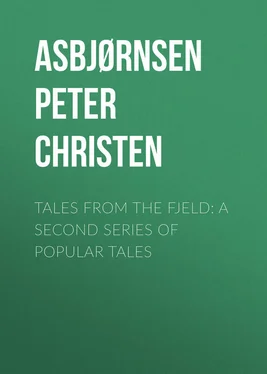Peter Asbjørnsen - Tales from the Fjeld - A Second Series of Popular Tales
Здесь есть возможность читать онлайн «Peter Asbjørnsen - Tales from the Fjeld - A Second Series of Popular Tales» — ознакомительный отрывок электронной книги совершенно бесплатно, а после прочтения отрывка купить полную версию. В некоторых случаях можно слушать аудио, скачать через торрент в формате fb2 и присутствует краткое содержание. Жанр: foreign_antique, foreign_prose, на английском языке. Описание произведения, (предисловие) а так же отзывы посетителей доступны на портале библиотеки ЛибКат.
- Название:Tales from the Fjeld: A Second Series of Popular Tales
- Автор:
- Жанр:
- Год:неизвестен
- ISBN:нет данных
- Рейтинг книги:5 / 5. Голосов: 1
-
Избранное:Добавить в избранное
- Отзывы:
-
Ваша оценка:
- 100
- 1
- 2
- 3
- 4
- 5
Tales from the Fjeld: A Second Series of Popular Tales: краткое содержание, описание и аннотация
Предлагаем к чтению аннотацию, описание, краткое содержание или предисловие (зависит от того, что написал сам автор книги «Tales from the Fjeld: A Second Series of Popular Tales»). Если вы не нашли необходимую информацию о книге — напишите в комментариях, мы постараемся отыскать её.
Tales from the Fjeld: A Second Series of Popular Tales — читать онлайн ознакомительный отрывок
Ниже представлен текст книги, разбитый по страницам. Система сохранения места последней прочитанной страницы, позволяет с удобством читать онлайн бесплатно книгу «Tales from the Fjeld: A Second Series of Popular Tales», без необходимости каждый раз заново искать на чём Вы остановились. Поставьте закладку, и сможете в любой момент перейти на страницу, на которой закончили чтение.
Интервал:
Закладка:
P. Chr. Asbjörnsen
Tales from the Fjeld: A Second Series of Popular Tales
PREFACE
The Tales contained in this volume form a second series of those "Popular Tales from the Norse," which have been received with much favour in this country, and of which a Third Edition will shortly be published. A part of them appeared some years ago in Once a Week , from which they are now reprinted by permission of the proprietors, the Norse originals, from which they were translated, having been communicated by the translator's friend, P. Chr. Asbjörnsen, to various Christmas books, published in Christiania. In 1871, Mr. Asbjörnsen collected those scattered Tales and added some more to them, which he published under the title "Norske Folke-Eventyr fortalte of P. Chr. Asbjörnsen, Ny Samling." It is from this new series as revised by the collector that the present version has been made. In it the translator has trodden in the path laid down in the first series of "Tales from the Norse," and tried to turn his Norse original into mother English, which any one that runs may read.
That this plan has met with favour abroad as well as at home is proved by the fact that large editions of the "Tales from the Norse" have been printed by Messrs. Appleton in New York, by which, no doubt, that appropriating firm have been great gainers, though the translator's share in their profits has amounted to nothing. It is more grateful to him to find that in Norway, the cradle of these beautiful stories, his efforts have been warmly appreciated by Messrs Asbjörnsen and Moe, who, in their preface to the Third Edition, Christiania, 1866, speak in the following terms of his version: "In France and England collections have appeared in which our Tales have not only been correctly and faultlessly translated, but even rendered with exemplary truth and care, – nay, with thorough mastery; the English translation, by George Webbe Dasent, is the best and happiest rendering of our Tales that has appeared, and it has in England been more successful and become far more widely known than the originals here at home." Then speaking of the Introduction, Messrs. Asbjörnsen and Moe go on to say, "We have here added the end of this Introduction to show how the translator has understood and grasped the relation in which these Tales stand to Norse nature and the life of the people, and how they have sprung out of both."
The title of this volume, "Tales from the Fjeld," arose out of the form in which they were published in Once a Week . The translator began by setting them in a frame formed by the imaginary adventures of English sportsmen on the Fjeld or Fells in Norway. "Karin and Anders," and "Edward and I," are therefore the creatures of his imagination, but the Tales are the Tales of Asbjörnsen. After a while he grew weary of the setting and framework, and when about a third of the volume had been thus framed, he resolved to let the Tales speak for themselves and stand alone as in the first series of "Popular Tales from the Norse."
With regard to the bearing of these Tales on the question of the diffusion of race and tradition, much might be said, but as he has already traversed the same ground in the Introduction to the "Tales from the Norse," he reserves what he has to say on that point till the Third Edition of those Tales shall appear. It will be enough here to mention that several of the Tales now published are variations, though very interesting ones, from some of those in the first series. Others are rather the harvest of popular experience than mythical tales, and on the whole the character of this volume is more jocose and less poetical than that of its predecessor. In a word, they are, many of them, what the Germans would call "Schwänke."
Of this kind are the Tales called "The Charcoal Burner," "Our Parish Clerk," and "The Parson and the Clerk." In "Goody 'gainst the Stream," and "Silly Men and Cunning Wives," the reader, skilled in popular fiction, will find two tales of Indian origin, both of which are wide-spread in the folklore of the West, and make their appearance in the Facetiæ of Poggio. The Beast Epic, in which Jacob Grimm so delighted, is largely represented, and the stories of that kind in this volume are among the best that have been collected. One of the most mythical and at the same time one of the most domestic stories of those now published, is, perhaps, "The Father of the Family," which ought rather to have been called "The Seventh, the Father of the Family," as it is not till the wayfarer has inquired seven times from as many generations of old men that he finds the real father of the family Mr. Ralston, the accomplished writer and editor of "Russian Popular Tales," has pointed out in an article on these Norse Tales, which appeared in Fraser's Magazine for December, 1872, the probable antiquity of this story, which he classes with the Rigsmal of the Elder Edda. That it was known in England two centuries ago is proved by the curious fact that it has got woven into the life of "Old Jenkins," whose mythical age as well as that of "Old Parr," Mr. Thoms has recently demolished in his book on the "Longevity of Man." The story as quoted by Mr. Thoms, from Clarkson's "History and Antiquities of Richmond," in Yorkshire, is so curious that it is worth while to give it at length. There had been some legal dispute in which the evidence of Old Jenkins, as confessedly "the oldest inhabitant" was required, and the agent of Mrs. Wastell, one of the parties, went to visit the old man. "Previous to Jenkins going to York," says Mr. Clarkson, "when the agent of Mrs. Wastell went to him to find out what account he could give of the matter in dispute, he saw an old man sitting at the door, to whom he told his business. The old man said 'he could remember nothing about it, but that he would find his father in the house, who perhaps could satisfy him.' When he went in he saw another old man sitting over the fire, bowed down with years, to whom he repeated his former questions. With some difficulty he made him understand what he had said, and after a little while got the following answer, which surprised him very much: 'That he knew nothing about it, but that if he would go into the yard he would meet with his father, who perhaps could tell him.' The agent upon this thought that he had met with a race of Antediluvians. However into the yard he went, and to his no small astonishment found a venerable man with a long beard, and a broad leathern belt about him, chopping sticks. To this man he again told his business, and received such information as in the end recovered the royalty in dispute." "The fact is," adds Mr. Thoms, "that the story of Jenkins' son and grandson is only a Yorkshire version of the story as old or older than Jenkins himself, namely, of the very old man who was seen crying because his father had beaten him for throwing stones at his grandfather." On which it may be remarked, that however old Old Jenkins may have been, this story has probably out-lived as many generations as popular belief gave years to his life. Another old story is "Death and the Doctor," which centuries ago got entangled with the history of the family of Bethune, in Scotland, who were supposed to possess an hereditary gift of leechcraft, derived in the same way. "Friends in Life and Death," is a Norse variation of Rip van Winkle, which is nothing more nor less than a Dutch popular tale, while the lassie who won the prince by fulfilling his conditions of coming to him, "not driving and not riding, not walking and not carried, not fasting and not full-fed, not naked and not clad, not by daylight and not by night," has its variations in many lands. It is no little proof of the wonderful skill of Hans Christian Andersen, and at the same time of his power to enter into the spirit of popular fiction, that he has worked the tale of "The Companion" into one of his most happy stories.
Читать дальшеИнтервал:
Закладка:
Похожие книги на «Tales from the Fjeld: A Second Series of Popular Tales»
Представляем Вашему вниманию похожие книги на «Tales from the Fjeld: A Second Series of Popular Tales» списком для выбора. Мы отобрали схожую по названию и смыслу литературу в надежде предоставить читателям больше вариантов отыскать новые, интересные, ещё непрочитанные произведения.
Обсуждение, отзывы о книге «Tales from the Fjeld: A Second Series of Popular Tales» и просто собственные мнения читателей. Оставьте ваши комментарии, напишите, что Вы думаете о произведении, его смысле или главных героях. Укажите что конкретно понравилось, а что нет, и почему Вы так считаете.












